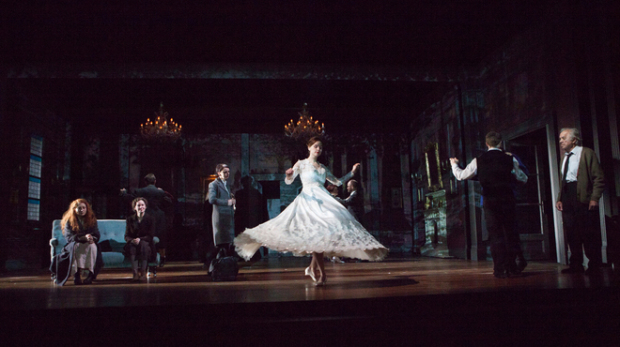You have no items in your cart. Want to get some nice things?
Go shopping
Expanding on Tolstoy’s concept that all unhappy families are unhappy in their own way, 3 Winters is a sprawling yet intimate portrait of familial conflict across three generations in the home they build following the devastation of the Second World War. As the action switches between 1945, 1990 and 2011, playwright Tena Štivičić and a strong ensemble cast delve into the lives of the Kos family – with a particular focus on its fiery females.
The play’s believably colourful cast of characters runs the gauntlet from Jo Herbert’s pregnant Rose King – fighting against post-war strictures and hoping for a new start in a home chosen almost at random in a government office – through hard-working matriarch Masha Kos to her two daughters Alisa and Lucia. In a beautiful piece of staging design from Tim Hatley and acclaimed director Howard Davies, each scene change is heralded by projected film footage that helps to locate the action in time and place. These projections extend across the entire stage, dappling the actors’ faces as well as the house itself. The design acts as very effective shorthand to suggest that both the family and their home are a microcosm of Croat society, one of the key themes of Štivičić’s writing. Indeed, most of the conversations and arguments (especially in the first act) involve discussion of politics and societal change, and how this will affect the Kos family and the country as a whole. If anything, there is a little too much information thrown at the audience and we are required to pay close attention or risk getting hopelessly lost. It is an ambitious tactic to progress from this declamatory style to the more emotional scenes of the second act, but it is certainly worth sticking with 3 Winters past the interval as many of the inner depths and feelings hinted at in act one come bubbling up to the surface and support a satisfying conclusion.
The actors certainly do their best to keep us engaged and mostly stop the play becoming bogged down in discussion. Particular highlights are Lucy Black’s Dunya – a potentially one-note character elevated by Black’s warm and naturalistic portrayal, showing her skill with this kind of drama just as Children of the Sun did at the same venue last year – and Jodie McNee’s progressive and stubborn but ultimately loving Alisa, one of the two daughters at the heart of the story. There’s also striking work in a more minor role from Hermione Gulliford and Susan Engel as Karolina at two stages of this intriguing character’s life. Karolina, who has been shunted from one psychiatric institute to another, has a connection with the Kos family that impacts on each successive generation as the play goes on, and both Gulliford and Engel imbue her with a haughty grandeur coupled with regret and a strong desire to make amends for past actions. Among the men, James Laurenson and Gerald Kyd stand out with a pair of moving and well-delivered monologues, and though Adrian Rawlins as Vlado (husband of Masha) starts out shouting a little too much, by the end of the play we come to see his caring nature behind the bluster and understand him a lot better. This is mainly due to a gentle scene between Vlado and Masha in the second act, in which they worry over the family’s fortunes and express a few sentiments that have clearly been bottled up for a while. Siobhan Finneran (best known to a contemporary audience for her role in Downton Abbey) captures particularly well the internal conflict Masha experiences as her daughter Lucia prepares to get married.
It’s a play that examines the best way to survive – as a family and as an individual – in the face of seismic changes, both personal and more general. Events from the past that may have initially seemed to be mistakes are refigured as fortunate accidental solutions, and in Sophie Rundle’s seemingly flighty Lucia the Kos family is presented with an unexpected way to ensure their family continues. For better or worse, Štivičić tells us, you can’t control how your family will mould and shape your life – time sweeps you along with it and we must adapt to survive.

About Michael Reffold
Michael is a graduate of Lancaster University, with a Master's in European Languages and Cultures following swiftly on from a BA in English Literature and Creative Writing. He loves all aspects of theatre – both watching and performing, being a keen amateur actor. He is currently a Senior Editorial Assistant at BioMed Central and a casual duty manager for Theatres Trust.




